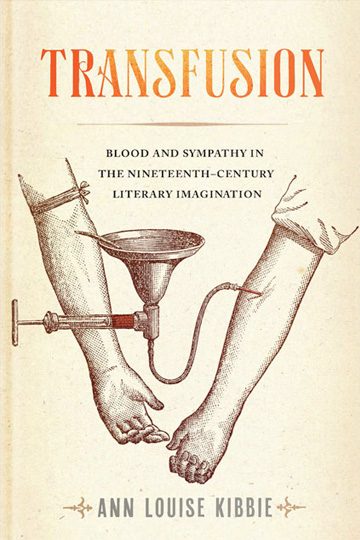
- Publisher: The University of Virginia Press
- Available in: Cloth, eBook, Paper
- ISBN: 9780813943138
“England may with justice claim to be the native land of transfusion,” wrote one European physician in 1877, acknowledging Great Britain’s crucial role in developing and promoting human-to-human transfusion as treatment for life-threatening blood loss. As news of this revolutionary medical technique spread from professional publications to popular journals and newspapers, the operation invaded the Victorian imagination. Transfusion is the first extended study of this intersection between medical and literary history. It examines the medical discourse that surrounded the real nineteenth-century practice of transfusion, which focused on women suffering from uterine hemorrhage, alongside literary works that exploited the operation’s sentimental, satirical, sensational, and gothic potentials.
In the eighteenth century, the term “transfusion” was used to figure aesthetic and religious inspiration as well as erotic and romantic commingling—associations that persisted into the nineteenth century and informed attitudes toward the medical practice of blood transfer and the cultural conception of sympathetic exchange. Exploring transfusion’s role in canonical works such as Wells’s The Island of Dr. Moreauand Stoker’s Dracula, as well as a surprising array of lesser-known short stories and novels, Kibbie demonstrates the tangled, mutually informing relationship between science and culture. This innovative study traces the creation of a new fluid economy between persons, one that could be seen to forge new forms of intimacy between donors and recipients or to threaten the very idea of personal identity.
Reviews
A delightful, fascinating book that should attract a broad audience, from scholars of eighteenth-century culture exploring the long history of sympathy, to historians of science interested in the emergence of the so-called tissue economy. Richly researched and theoretically astute, Transfusion is an excellent study in the popular presentation and imaginative transformation of Victorian medical ideas
-Mark Blackwell, University of Hartford, editor of The Secret Life of Things: Animals, Objects, and It-Narratives in Eighteenth-Century England
Ann Louise Kibbie examines the cultural work that literature asks blood to carry in the nineteenth century, illuminating both how blood appears as an emblematic carrier of sympathy and how it produces recoil against the very idea of crossing bodily boundaries. Transfusion is a thoroughly engaging account of an improbably gripping subject.
-Frances Ferguson, University of Chicago, author of Pornography, the Theory: What Utilitarianism Did to Action